Khartoon!
Sudanese satire
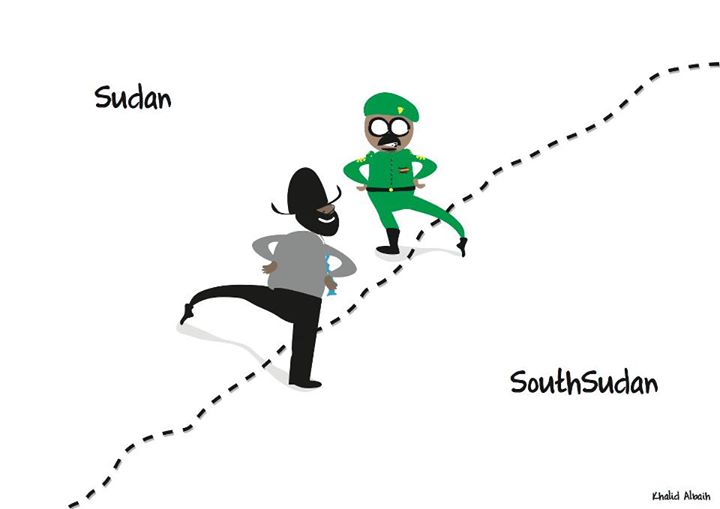
There is a cartoonist in Qatar who has Sudanese roots and an Eastern European upbringing, but called Doha his home since the age of ten. His cartoons are graphical and satirical, mocking political leaders across the region. Many of them portray – in a hilarious and very on-the-spot way – the two leaders of what is now Sudan and South Sudan: Omar Al-Bashir and Salva Kiir Mayardit.
His name is Khalid Albaih and his work can be found at Khartoon!. Mashallah spoke with him about Sudanese cartoons, the revolutions, and public art in the region.
Khalid + Khartoum + cartoon = Khartoon!
“What inspires me is simplicity. I want to make my cartoons as simple as possible, to reach many people. If they have a simple and unique style, many will be attracted to them,” says Khalid. This seems to have worked. Khartoon! has a large following, both in the region and outside: the Facebook page, where all new cartoons are posted, has more than 5,000 likes. “I’ve reached out to a lot of people,” says Khalid. “Most of my followers come from Sudan, Algeria, Egypt and the UK and quite a lot from Brazil also. Beyond that, they are from all over the world.”
Much of his work deals with issues in the two Sudans: the consequences of the split, political corruption and the flaws and shortcomings of the two leaderships. There is a great cartoon where Al-Bashir and Kiir stand on each side of the border and both of them cannot help but put their foot on the other’s territory. Another is called “Clown VS Puppet” and portrays Al-Bashir with a big red nose and Kiir with someone pulling his strings. Yet another one shows the President in Khartoom with a speech balloon filled with the word كلام, Arabic for “talk”. Next to him stands a dispirited citizen saying انا جعان, “I’m hungry”.
The Sudanese connection
“I focus a lot on Sudan in my work,” says Khalid, “and I’m not alone. There are many great cartoonists in Sudan, but they are not online. They are all published in the local newspapers. Me, I exist mostly online. I’ve tried to reach out to local and regional publications, but it’s hard. Both because of censorship and because of them not being used to new styles, new ways of doing political cartoons.”
Khalid speaks about Sudan, and what makes the nation – nations now – special in the Arab context. “Back in 1985, we had a revolution. We’ve had two revolutions against our dictators before. But now, well, the problem is that the split came right in the middle of the Arab Spring. As for people in Sudan, they just wanted the troubles to be over. They just wanted peace. And many thought that could be accomplished through the split. But now we have new problems.”
Even though his cartoons are political, Khalid does not want to be associated with any specific group or movement, not in the Sudanese context. He prefers to remain independent, sharing his opinions through his cartoons. “I don’t want to be part of any political agenda. I’m Sudanese, I’m Arab, I’m Muslim. This is what I stand for. I stay at a safe distance from the political parties in Sudan. It gives me the opportunity to make fun of them. And, as a cartoonist, you never run out of material. Politicians keep lying, so we can keep making fun of them,” he says.
Creative roots
Khalid started developing his creative side early. Born in Romania in 1980, he lived in Eastern Europe throughout his childhood. Then, the family went to Sudan, and moved to Doha when Khalid was ten. “My father, although Sudanese, is very Eastern European. He’s firm and straight. Art for him is a hobby, not something you work with. So it was hard being artistic around him. But that only made me want to go into art even more! And in Qatar, I found support in school,” says Khalid. He continues: “My father, who is a diplomat, was well into politics of course. We used to get this Egyptian magazine with political cartoons, Sabah al-Khair. That was my first exposure to cartoons. It made a very strong impression on me to see how they conveyed the message of a thousand word article in only one frame.”
It is this straightforwardness that has come to distinguish Khalid’s Khartoon!. His characters are graphical and uncomplicated, always easily recognisable. Al-Bashir is small and round; his counterpart in the south, Kiir, is always portrayed with his signature cowboy-hat. It is a language that Khalid has chosen with care. “Generally, in this part of the world,” he says, “people have enough trouble getting their kids to school, make sure they’re healthy and have dinner by the end of the day. Not many have the time or opportunity to go to museums, to develop an appreciation for art. So I try to make my cartoons as simple as possible. Accessible. And I put them all online so that they’re out there for everyone to see.”
The revolutions and the big change
For Khalid, who was creating cartoons before the revolutions started, 2011 was a big year. “Our world has changed,” he says. “After the revolutions, everything was different. There is one graphic that I did immediately after the events in Tunisia started happening, saying that it would spread throughout the region. And it did! I felt that I was part of the revolution through the cartoons I was making. People in Egypt and then Lebanon used an illustration of mine as graffiti. That made me feel so proud. They even signed my name and sent me a picture of the piece.”
Something that matters a lot to Khalid is the growth of cultural expression that has come with the revolutions. “The first thing that happened is that graffiti exploded,” he says. “Art started coming to people. This is great, because our role as artists is to use creativity to get messages out. And I believe in simplicity. In the region, there’s always a lot of talk. Politicians talk and talk, but they do nothing. I want my cartoons to be the opposite of that. There’s no need to talk for a long time when you can say the same thing in a very simple way.”
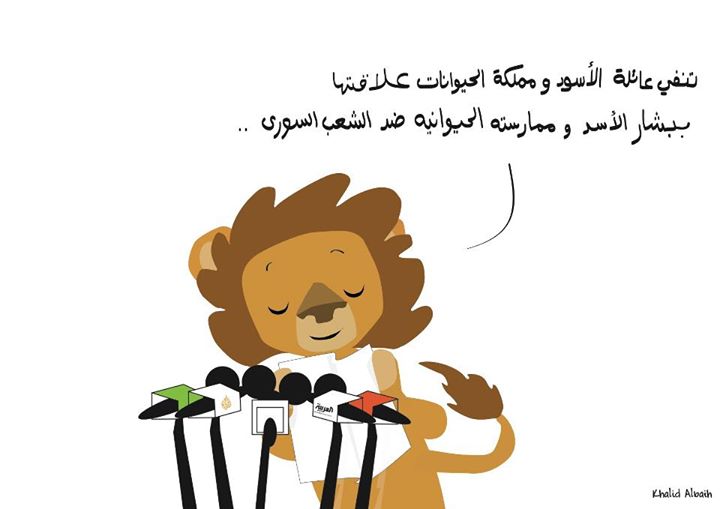
Syrian president Bashar Al-Assad’s last name means “the lion”. This lion says: “On behalf of all lions and the whole animal kingdom, I deny any connection to Bashar Al-Assad’s animal-like treatment of the Syrian people”.
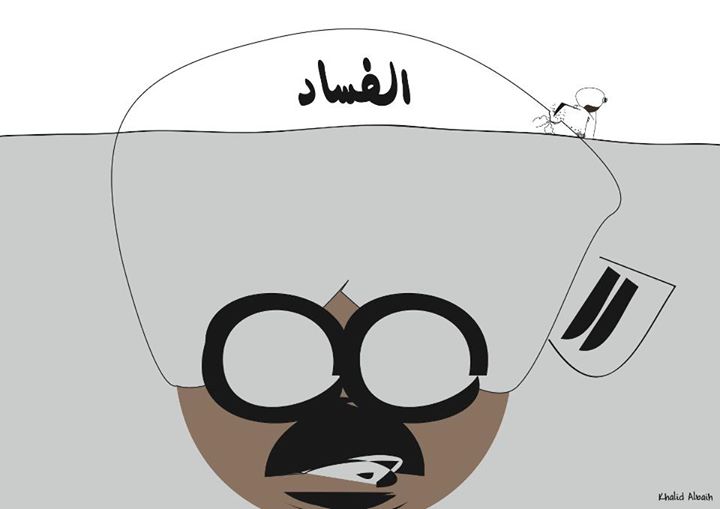
The top of the iceberg: political corruption.
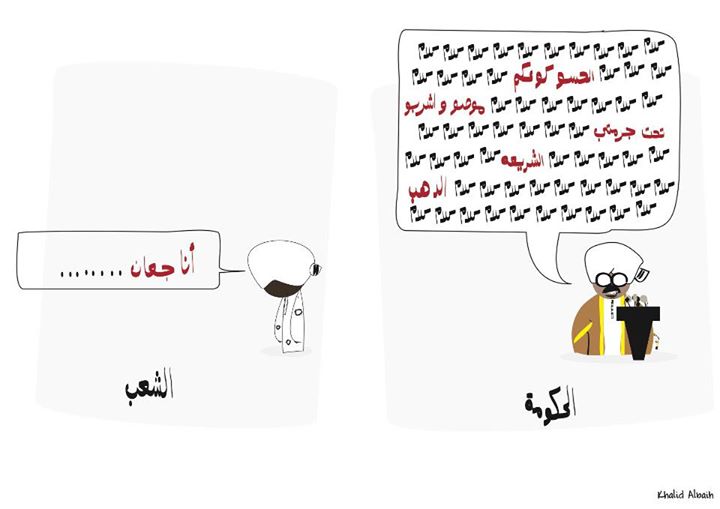
Only talk, no action. Al-Bashir repeats the word “talk” while the Sudanese citizen next to him says “I’m hungry”.
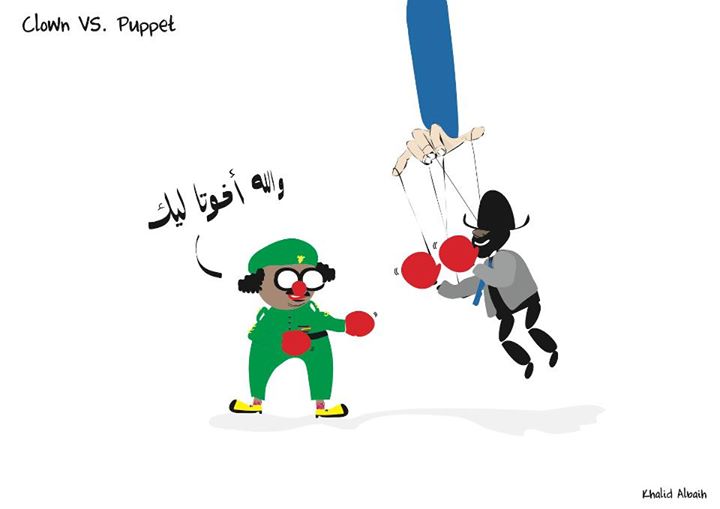
Al-Bashir as a clown, Kiir as a marionette.








One thought on “Khartoon!”
Comments are closed.